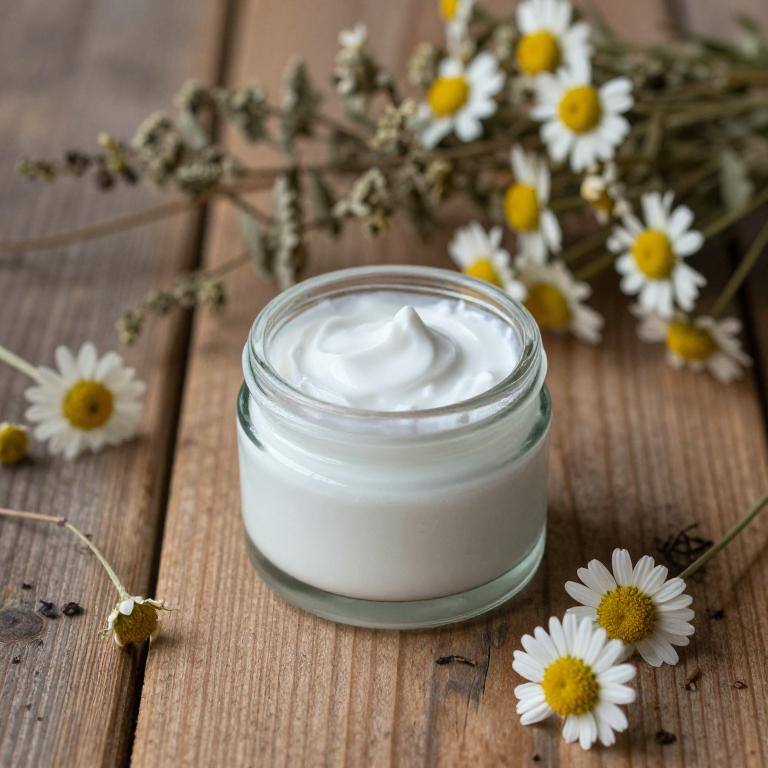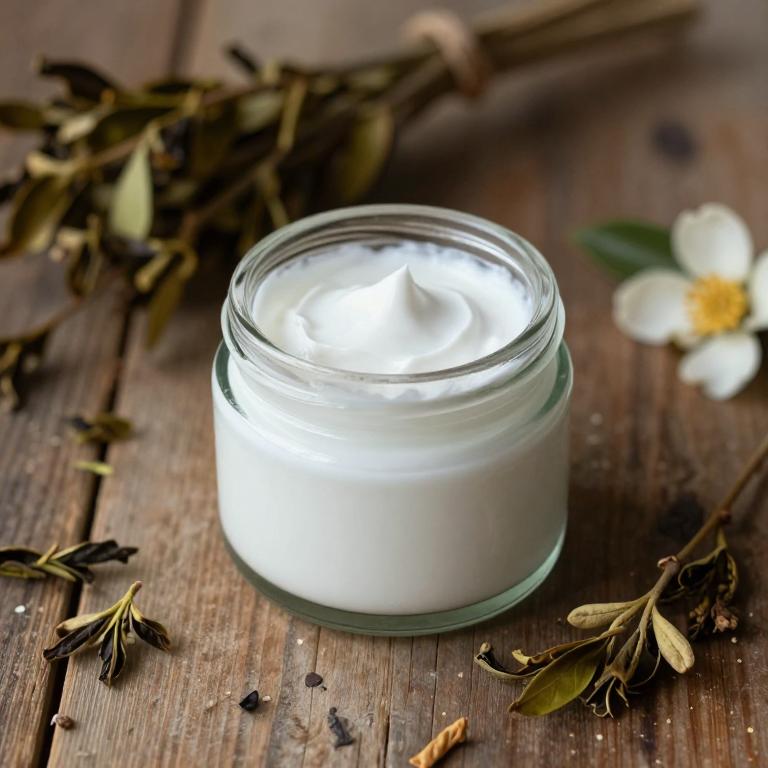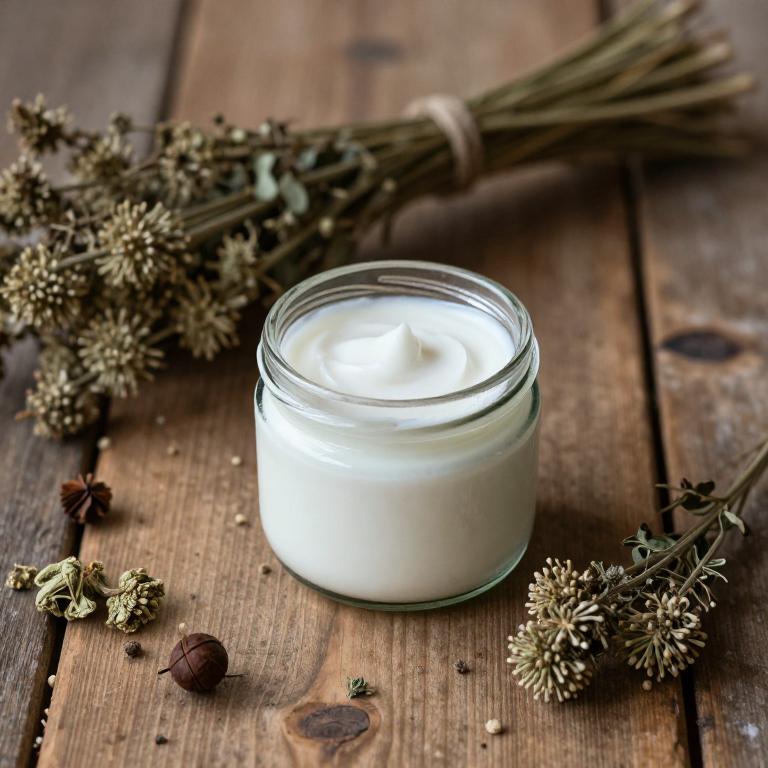10 Best Herbal Creams For Psoriasis

Herbal creams for psoriasis are natural topical treatments that aim to reduce inflammation, itching, and skin scaling associated with the condition.
These creams often contain ingredients such as aloe vera, chamomile, calendula, and turmeric, which are known for their anti-inflammatory and soothing properties. While they may offer relief for some individuals, their effectiveness can vary, and they are generally considered complementary rather than a primary treatment. It is important for users to consult with a healthcare provider before using herbal creams to ensure they are safe and appropriate for their specific condition.
Overall, herbal creams can be a gentle option for managing psoriasis symptoms, but they should not replace prescribed medical treatments without professional guidance.
Table of Contents
- 1. Aloe vera (Aloe barbadensis)
- 2. St. john's wort (Hypericum perforatum)
- 3. Stinging nettle (Urtica dioica)
- 4. Ginger (Zingiber officinale)
- 5. Blessed thistle (Cnicus benedictus)
- 6. German chamomile (Chamomilla recutita)
- 7. Salvia (Salvia officinalis)
- 8. Camellia (Camellia sinensis)
- 9. English lavender (Lavandula angustifolia)
- 10. Dandelion (Taraxacum officinale)
1. Aloe vera (Aloe barbadensis)

Aloe barbadensis, commonly known as aloe vera, is often used in herbal creams for psoriasis due to its soothing and anti-inflammatory properties.
These creams can help reduce redness, scaling, and itching associated with psoriasis by moisturizing the skin and promoting healing. The gel from the aloe plant contains vitamins, enzymes, and antioxidants that may support skin regeneration and overall skin health. While aloe vera is generally safe for topical use, some individuals may experience allergic reactions or irritation, so a patch test is recommended before regular application.
Although it can be a complementary treatment, aloe-based creams should not replace prescribed medications without consulting a healthcare professional.
2. St. john's wort (Hypericum perforatum)

Hypericum perforatum, commonly known as St. John's wort, is a herbal remedy that has been traditionally used for its anti-inflammatory and soothing properties.
While it is more widely recognized for treating mild depression, some studies suggest that its compounds may help reduce inflammation and redness associated with psoriasis. Hypericum perforatum herbal creams often contain essential oils and extracts that can be applied topically to affected skin areas. These creams are generally considered safe for external use, though they may interact with other medications or cause photosensitivity in some individuals.
As with any treatment, it is advisable to consult a healthcare provider before using hypericum perforatum creams for psoriasis to ensure they are appropriate for your specific condition.
3. Stinging nettle (Urtica dioica)

Urtica dioica, commonly known as stinging nettle, has been traditionally used in herbal medicine for its anti-inflammatory and skin-soothing properties.
Urtica dioica herbal creams are often formulated with extracts from the plant's leaves, which contain compounds like histamine, serotonin, and various antioxidants that may help reduce inflammation and irritation. These creams are sometimes used as a complementary treatment for psoriasis due to their potential to alleviate symptoms such as redness, itching, and scaling. However, while some individuals report relief from using these creams, scientific evidence supporting their efficacy for psoriasis is limited, and they should not replace prescribed medical treatments.
It is important to consult a healthcare provider before using any herbal remedy, especially for a chronic condition like psoriasis.
4. Ginger (Zingiber officinale)

Zingiber officinale, commonly known as ginger, has been traditionally used for its anti-inflammatory and antioxidant properties, which may offer potential benefits for individuals with psoriasis.
Herbal creams containing zingiber officinale are formulated to soothe inflamed skin and reduce redness associated with psoriasis symptoms. These creams often combine ginger extract with other natural ingredients like turmeric or aloe vera to enhance their therapeutic effects. While some users report relief from topical application, it is important to consult a healthcare provider before using such products, as they may not replace conventional treatments.
Research on the efficacy of ginger-based creams for psoriasis is ongoing, and more clinical studies are needed to fully understand their role in managing the condition.
5. Blessed thistle (Cnicus benedictus)

Cnicus benedictus, commonly known as St. Benedict's thistle, has been traditionally used in herbal medicine for its potential anti-inflammatory and skin-soothing properties.
Herbal creams containing Cnicus benedictus are often recommended for individuals suffering from psoriasis due to their ability to reduce redness, scaling, and itching associated with the condition. The active compounds in this plant, such as flavonoids and tannins, may help modulate the immune response and promote skin healing. While some studies suggest that topical applications of Cnicus benedictus may offer relief, more clinical research is needed to fully establish its efficacy and safety for psoriasis treatment.
As with any herbal remedy, it is important to consult a healthcare professional before incorporating Cnicus benedictus creams into a psoriasis management plan.
6. German chamomile (Chamomilla recutita)

Chamomilla recutita, commonly known as German chamomile, is often used in herbal creams for psoriasis due to its anti-inflammatory and soothing properties.
These creams typically contain chamomile extract, which helps reduce redness, irritation, and scaling associated with psoriasis. The essential oils in chamomile, such as bisabolol, have been shown to have calming effects on the skin, promoting healing and relief. While herbal creams may offer some symptomatic relief, they should not replace prescribed medical treatments for psoriasis.
It is important to consult a healthcare professional before using any herbal remedy to ensure it is safe and appropriate for individual needs.
7. Salvia (Salvia officinalis)

Salvia officinalis, commonly known as common sage, has been traditionally used for its anti-inflammatory and antimicrobial properties, making it a potential ingredient in herbal creams for psoriasis.
These creams often combine sage extract with other natural components like aloe vera or chamomile to enhance their soothing effects on the skin. Studies suggest that the active compounds in sage, such as rosmarinic acid, may help reduce redness, scaling, and itching associated with psoriasis. While not a cure, sage-based creams can serve as a complementary therapy to support conventional treatments.
However, individuals should consult a healthcare provider before using these products to ensure they are safe and suitable for their specific condition.
8. Camellia (Camellia sinensis)

Camellia sinensis, the plant from which green and black teas are derived, has been explored for its potential benefits in treating psoriasis due to its rich content of polyphenols and antioxidants.
Herbal creams infused with Camellia sinensis extracts may help reduce inflammation and skin irritation associated with psoriasis by modulating immune responses and promoting skin repair. These natural formulations are often preferred by individuals seeking alternatives to conventional treatments, which can have side effects. Studies suggest that the anti-inflammatory properties of Camellia sinensis may contribute to improved skin texture and reduced plaque formation in psoriasis patients.
However, further clinical research is needed to fully understand its efficacy and long-term safety in managing this chronic skin condition.
9. English lavender (Lavandula angustifolia)

Lavandula angustifolia, commonly known as English lavender, is often incorporated into herbal creams for its soothing and anti-inflammatory properties.
These creams are popular among individuals with psoriasis due to their ability to reduce redness, itching, and skin irritation associated with the condition. The essential oils in lavender, such as linalool and lavandin, have been shown to possess antimicrobial and calming effects that may help improve the overall skin condition. When applied topically, lavender-infused creams can provide a gentle, natural alternative to conventional treatments, offering relief without the side effects of harsh chemicals.
However, it is important to consult a healthcare professional before using these products, especially if you have sensitive skin or are undergoing other treatments for psoriasis.
10. Dandelion (Taraxacum officinale)

Taraxacum officinale, commonly known as dandelion, is a herbal ingredient that has been traditionally used for its anti-inflammatory and detoxifying properties.
Herbal creams containing Taraxacum officinale are often used as a natural alternative for managing psoriasis symptoms, such as redness, itching, and scaling. These creams may help reduce skin inflammation by promoting the elimination of toxins and supporting liver function, which is crucial in psoriasis management. While some studies suggest that dandelion may have soothing effects on the skin, more clinical research is needed to fully understand its efficacy in treating psoriasis.
As with any herbal remedy, it is advisable to consult a healthcare professional before incorporating Taraxacum officinale creams into a psoriasis treatment plan.